 Petzlover
PetzloverCesky Terrier is originated from Czech Republic but Dogo Cubano is originated from Cuba. Cesky Terrier may grow 28 cm / 11 inches shorter than Dogo Cubano. Cesky Terrier may weigh 36 kg / 79 pounds lesser than Dogo Cubano. Cesky Terrier may live 5 years more than Dogo Cubano. Cesky Terrier may have less litter size than Dogo Cubano. Cesky Terrier requires Moderate Maintenance. But Dogo Cubano requires Low Maintenance
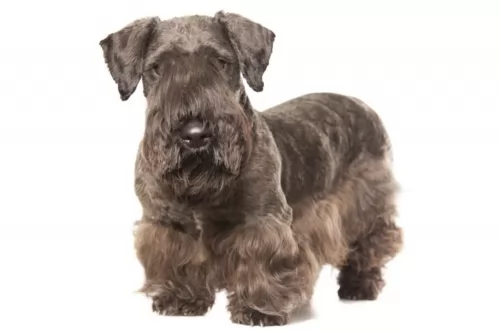 Known as the Bohemian Terrier and looking similar to a Scottish Terrier dog, the Cesky Terrier is a dog breed that has been created by Frantisek Horak, in the Czech Republic.
Known as the Bohemian Terrier and looking similar to a Scottish Terrier dog, the Cesky Terrier is a dog breed that has been created by Frantisek Horak, in the Czech Republic.
Horak wanted to breed a type of hunting dog, and in 1949, using both the Scottish Terrier ad the Sealyham Terrier, he bred the two, creating a new breed that would hopefully be a stronger hunting dog.
The Cesky Terrier was shown for the first time in 1959 and was recognized by the Federation Cynologique Internationale in 1963 and in 1993 by the United Kennel Club. It’s a rare dog this, and is the national dog of the Czech Republic.
The Cuban Mastiff which came from Cuba, was developed from breeds of Mastiffs, Bulldogs and cattle dogs, with the breed being thought to be extinct since the end of the 19th century.
The Dogo Cubano had a number of roles to fulfill in its day and they were used for guarding stock, for dog fighting and for chasing runaway slaves. After the abolishment of slavery, the large dog had no real role and it died out.
Known also as the Cuban Mastiff or Mastin de Cuba, there isn’t much accuracy as to its origins, with the most common story for their origin being that they are descendants of the Molossus.
The dogs were later introduced into Western Europe, becoming fairly common in England and Spain. The dog was also was also mentioned in the works of canine authors Stonehenge and George Wood.
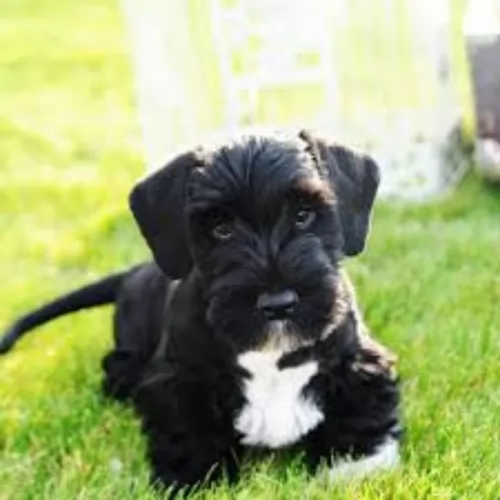 The Cesky Terrer is a longish dog, much like the Scottie and he also has short legs. He is roughly 29ck in height at the withers, is about 43cm in length and weighs anything from 5 to 10kg.
The Cesky Terrer is a longish dog, much like the Scottie and he also has short legs. He is roughly 29ck in height at the withers, is about 43cm in length and weighs anything from 5 to 10kg.
The coat of this dog is long, silky and quite wavy and can be in a number of different shades of gray or a light brown color. Puppies are born black. The soft coat can be kept groomed by clippers or you can take him to have his coat professionally trimmed.
This dog breed has natural drop ears, unlike the Scottie which has erect ears. The tail length is 18-20 cm and low set.
A loyal, quiet and loving family dog, the Cesky Terrier will get on well with children in the home and he is also friendly with other dogs. Just like with any other dog, it will be important to socialize the dog breed at an early age as then he becomes obedient, smart and relaxed. He is a breed which is also easy to train. He also makes a good watchdog.
The Dogo Cubano was generally similar to other Mastiffs and stood at rough 48 – 55cm in height and weighing in the region of 45kg.
He was a large dog, powerfully built, muscular and strong. Images of the dog show that it had strong, straight legs with a long tapering tail and medium-sized floppy ears that were sometimes cropped upwards and close to the head.
The dog breed came in a variety of colors such as brown, tan, fawn and brindle. The muzzle was broad and short and black. The dog had pronounced jowls with its face being fairly wrinkly.
This large dog was known for being a courageous, independent and aggressive dog. He became attached to his owner, showing protective characteristics .In those days the dog would have received simple training and certainly if such a large dog still existed today, it would have to receive training and socialization as well.
The Dogo Cubano was an intelligent dog and easily trainable, requiring an owner with a firm hand. Being an aggressive breed, the dog possibly wouldn’t have been the best companion for children. He also wouldn’t have got on too well with pets in the home as he was trained to be a fighter in his day. Independent and strong-willed, the dog would not have suited a novice dog owner.
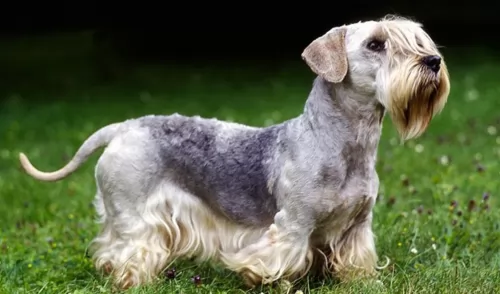 The Cesky Terrier isn’t a small-dog yapper and he will adapt to life in the city or the country. He is a small dog, but he is feisty and sporty and will willingly join you with your jogging or when you go on a walk.
The Cesky Terrier isn’t a small-dog yapper and he will adapt to life in the city or the country. He is a small dog, but he is feisty and sporty and will willingly join you with your jogging or when you go on a walk.
He is intelligent and playful and when you add in characteristics such as being courageous, loving, loyal and feisty, you can see that the Cesky Terrier is guaranteed to make a super family pet.
The Dogo Cubano was bred to be a guard dog as well as for dog fighting, but this large dog, with training and socialization, no doubt became a loyal and devoted family pet.
It was actually a social dog, being aggressive towards other dogs. He would be described as a dog better suited to a home with older children.
He was protective with his human family but not very active, being too big to be leaping around like other dog breeds. It is a pity that this large dog has disappeared as he had some good qualities.
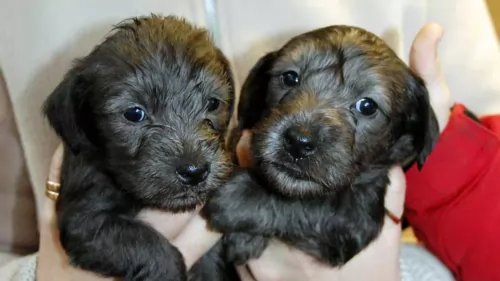 The Cesky Terrier is generally a healthy dog, but this breed sometimes suffers from common dog ailments that other breeds also have to contend with.
The Cesky Terrier is generally a healthy dog, but this breed sometimes suffers from common dog ailments that other breeds also have to contend with.
Eye disorders, ear infections, pancreatitis, hip dysplasia and weight gain are just some health issues you might need to be aware of.
Remember that if you want to promote a healthier dog, feeding him a quality diet and taking him immediately to the vet when you suspect a problem can keep him free from common dog illnesses.
Pancreatitis for instances develops when the pancreas becomes inflamed, and this can be brought on by allowing your pet to become obese. There are other reasons for pancreatitis too such as infection. You will see diarrhea, fever and vomiting with your pet as well as discomfort from abdominal pain. It’s a disease which affects smaller dogs more often than larger breeds.
The Dogo Cubano was a generally healthy breed, but just like with most other dog breeds, they were also prone to some of the more common dog problems. The chances of him getting sick were slim though.
When the dog first originated, there were unlikely to have been health clearance certificates, but today, you’d want health clearances from the Orthopedic Foundation for Animals.
The reason for this is that hip dysplasia is a heritable condition, seen more often in large dogs, where the thigh bone doesn’t fit into the hip joint properly. The dog suffers with pain and discomfort and the condition can lead to lameness with the dog.
Gastric Torsion or Bloat is a life threatening condition that affects large dogs like the Dogo Cubano and those with deep chests. The stomach is distended with gas and it can twist.
The gas can’t escape and blood flow is hindered. The dog vomits, is lethargic and weak, and immediate veterinary help will be required.
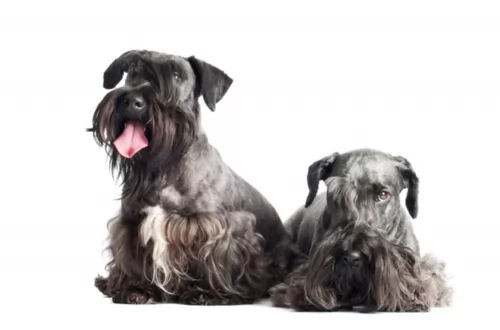 Cesky Terriers may well be a little bit less active and quieter than other terriers, but they will still need a good dose of exercise. He loves to dig, and if he is bored and doesn’t have a plenty of exercise and games, he will want to dig more and cause the owner a lot of frustration. Take him for daily walks and give him some ball games in the garden.
Cesky Terriers may well be a little bit less active and quieter than other terriers, but they will still need a good dose of exercise. He loves to dig, and if he is bored and doesn’t have a plenty of exercise and games, he will want to dig more and cause the owner a lot of frustration. Take him for daily walks and give him some ball games in the garden.
Cesky Terriers will need brushing down at least twice a week and their coats will need to be trimmed into shape every 8 to 10 weeks or so. You’ll also need to check excess hair inside the ears.
As with any dog breed, you will need to check on his nails so that they don’t grow too long and also brush his teeth 2 or 3 times a week to avoid dental disease.
The Dogo Cubano was a large dog, so if he did become used to living in the city, he would have adapted better to life in the country.
He wasn’t a dog requiring too much exercise but he would have needed to go for walks. They were used as guard dogs long ago, and if he had been in existence today, you wouldn’t have been able to include him in your jogging and cycling as he was a dog that could easily overheat.
Not all dogs require the same amount of food. Long ago the Dogo Cubano wouldn’t have had the same variety of dog foods available today. Maybe the dog in those days was fed the same kind of food that his owner ate.
Today, if these dogs were still around, they would require the best quality ‘large dog breed’ kibble.
The better the dog food, the more nourishing it is and the healthier the dog is. The Dog Cubano would likely have been a dog that drooled, leaving quite a bit of backwash in the water bowl, so it would have been important to wash out the drinking bowl and to regularly replace it with cool, fresh water.